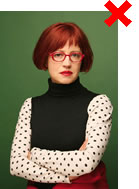
EUROKAZ 2006
The twentieth Eurokaz is an opportunity to recall past achievements, but also to embark on new adventures. The former will be the subject of a book published in English, the latter will be revealed in this year's public programme, which is perhaps less glamorous than one might expect, but that was just the intention: to celebrate, yet to speak wisely of humble and important decisions.
We are just not so good at organising revels of the kind we’ve all perhaps had more than our fair share. Celebration predicated upon oblivion, even if tinged with irony, simply isn't what we do. We have always stood for the weakening of logocentrism, and now we are ready to oust it. Even the theatre space which is in the focus of this year's Eurokaz, its social relevance notwithstanding, is the modest, feasts-and-media unfriendly theatre of intimacy.
In their productions, John Jasperse, Saša Božić, Béla Pintér, Bojan Jablanovac, Boris Bakal, and Branko Brezovec all engage different aspects of intimacy as a stylistic feature, but all aim towards the sharp gaze, the silent conclusions, with a minimum of aesthetic and moral interference, over and against the psychedelic, oxymoronic (intimacy as the royal road to freedom) effects of intimacy in the theatre of the sixties and seventies.
And now the far-reaching decision. After twenty years, Eurokaz starts to put more emphasis on production and co-production than on presentation. This is not only in consequence of the fact that while at the level of information Croatian theatre has reached a point of overload, the actual level of its practice is among the least developed in Europe. It is also because of a shortened lifespan of powerful, determined theatre concepts. If we want Croatian theatre to get in touch with the burning core of contemporary theatre, it is high time we replaced the tag “Seen that” with “Done that”. To do is already to create, but how to explain this in the area where the theatre has always been lyrical in the Reinhardt tradition, and has almost never dared to be epic? It will be hard, but it may be worth it.
If need be, this change of direction can be justified by citing the examples of the Wiener Festwochen, the Münchener Biennale, MESS, not to mention Avignon, Rome, Paris, Bruxelles,…
This year, Eurokaz presents four productions, while the fifth remains in doubt, since the scope of misunderstanding on the part of one of the main funders is such that it is not clear whether the negative reaction is caused by fear of the unknown, or by an irrational hatred and arrogance.
The productions are modest financially, but are created in the nice atmosphere of institutional co-operation. The partners include Teatar &td, the institution that has shown considerable understanding of our needs (as have we of theirs), the Academy of Drama Art (this is particularly heartening in view of a longstanding hostility towards us), the National Theatre Opera (an indication that our projects are of serious cultural interest and may have a future), the Ljubljana festival Ex Ponto, and Pintér Béla eś Társulata of Budapest.
The aesthetic rationale is different for each production.
Bojan Jablanovec and his Via Negativa indicate new forays in Slovenian theatre, after almost a decade of stagnation. As was the case with the generation of Živadinov and Taufer, Eurokaz is again the first to recognise their merits (after their apperance at Eurokaz #18 they performed at the Venice Biennale).
Niko Goršič is a great director-animator and the excellence of his staging of a work by one of the leading names of Slovenian playwriting, Dane Zajc, is guaranteed. We are, however, particularly pleased that it includes not only Vlasta Delimar, but also Goran Bertok's shocking paintings and whole departments of the Academy of Drama Art.
Eurokaz helped Saša Božić to turn an exceptional exam into a precise theatre structure, while the co-production with Béla Pintér's company should, in its dramatic cunning, indicate that we are interested in an intelligent communication between cultures.
Even though we have not given up, Milko Valent, one of the most prolific and gifted of Croatian writers, seems to be destined to remain an unknown name on the Croatian theatre stage. His piece Sweet Little Slaughterhouse, written especially for Eurokaz and co-produced by Tvornica, was to be directed by the German-Croatian director Nick Đurić, and performed to the rocking accompaniment of Hladno pivo. But the city's cultural institutions, in fear perhaps of the spaces of freedom Valent's worldview opens onto, have no wish to support us.
What kind of festival can afford to mention that it has the Burgtheater in its programme only at the end? The Burgtheater in Zagreb is a cultural event of the highest order, and Eurokaz expects to gain by it something for the conspiracy of theatre modernity. The ferociousness and anger of the Burgtheater production directed by Nicolas Stemmann should be a warning that the hour has come when we can no longer conceive of national theatre as an escape from reality.
Finally, other three guest performances include: John Jasperse with a performance that re-organizes the spectator's perception; Brezovec's Italo-Macedonian Timon of Athens, a filigree work of extraordinary power and stunning vistas; and, at the very end, a celebration – the spectacle of football and dance, the Brazilian choreographer Deborah Colker's Maracanã.
GORDANA VNUK
|
|